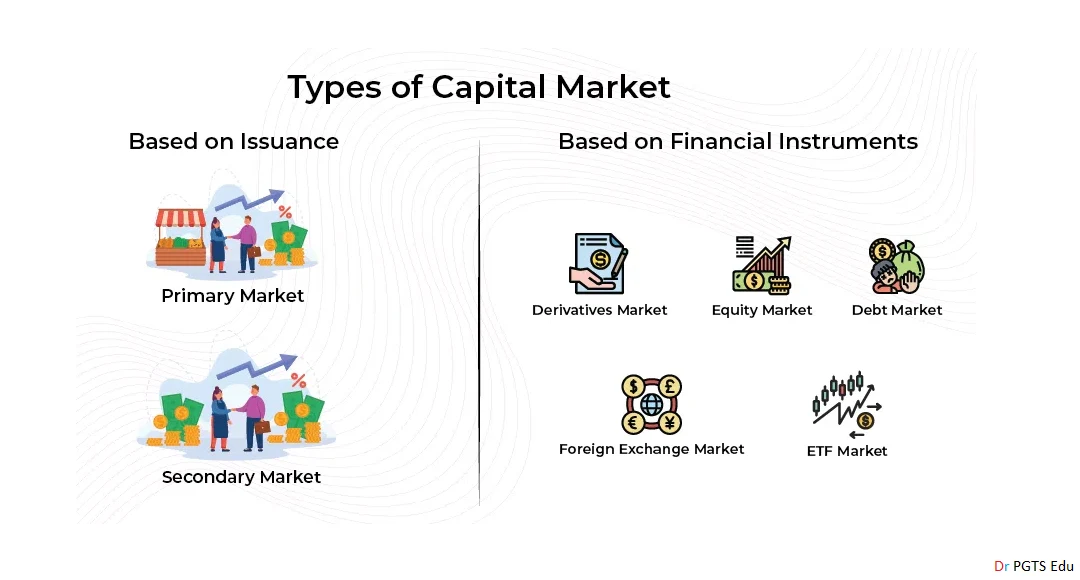Secrets of the Capital Market are the backbone of any economy, enabling companies to raise funds and investors to grow their wealth. Understanding the dynamics of capital markets can help individuals make informed decisions and maximize returns. This article explores the definition, features, kinds, functions, merits, demerits, and the specifics of the Indian capital markets.
Definition of Capital Markets
Capital markets refer to financial markets where long-term securities such as stocks, bonds, and derivatives are bought and sold. These markets serve as a bridge between investors and companies, facilitating the efficient allocation of resources and promoting economic growth.
Features of Capital Markets
- Long-Term Financing: Capital markets deal with securities that provide long-term funding for companies and governments.
- High Liquidity: Investors can buy and sell securities with ease due to well-established stock exchanges.
- Market Regulation: Regulatory bodies like SEBI in India ensure transparency and protect investors.
- Risk and Reward: While capital markets offer high returns, they also carry risks that require careful assessment.
- Variety of Instruments: Includes equities, bonds, mutual funds, and derivatives to cater to different investor preferences.
- Efficient Price Discovery: Prices of securities are determined through demand and supply forces in the market.
Kinds of Capital Markets
Capital markets are broadly classified into two types:

1. Primary Market
This is where new securities are issued for the first time. Companies raise capital by offering shares through Initial Public Offerings (IPOs). It enables businesses to expand and grow.
2. Secondary Market
The secondary market allows investors to trade previously issued securities. Stock exchanges like the Bombay Stock Exchange (BSE) and National Stock Exchange (NSE) in India provide a platform for such transactions, ensuring liquidity and market stability.
Functions of Capital Markets
- Mobilization of Savings: Encourages individuals to invest their savings, leading to capital formation.
- Wealth Generation: Investors can grow their wealth through capital appreciation, dividends, and interest earnings.
- Corporate Expansion: Businesses obtain necessary funds to invest in infrastructure and innovation.
- Economic Development: Supports national economic growth by directing funds into productive sectors.
- Risk Diversification: Investors can diversify their portfolios by choosing various investment instruments.
- Price Determination: The market reflects security values based on demand and supply, ensuring fair pricing.
Merits of Capital Markets
- Investment Growth: Investors can earn significant returns through stocks and bonds.
- Access to Capital: Companies can secure funding without relying solely on bank loans.
- Job Creation: A well-functioning capital market leads to corporate expansion and employment opportunities.
- Efficient Resource Allocation: Funds are directed toward profitable and innovative enterprises.
- Enhanced Liquidity: Investors can easily buy or sell securities, making the market dynamic.
Demerits of Capital Markets
- Market Volatility: Prices fluctuate due to economic conditions, impacting investment stability.
- Fraud and Manipulation: Despite regulations, insider trading and market manipulation remain concerns.
- Complexity: Requires financial knowledge and expertise to navigate successfully.
- Economic Dependence: Global and domestic economic changes affect capital market performance.
- Risk Exposure: Investors may face losses due to unpredictable market movements.
Secrets of the Capital Market in Indian
India’s capital market has evolved significantly, contributing to the country’s economic progress. It includes:

1. Stock Exchanges:
- Bombay Stock Exchange (BSE): Asia’s oldest stock exchange, established in 1875.
- National Stock Exchange (NSE): India’s largest stock exchange, known for its advanced electronic trading system.
2. Regulatory Framework:
- Securities and Exchange Board of India (SEBI): Regulates the market, ensuring transparency, investor protection, and market integrity.
3. Key Participants:
- Retail and institutional investors
- Foreign institutional investors (FIIs)
- Mutual funds, hedge funds, and pension funds
- Public and private corporations
4. Investment Opportunities:
- Equities, bonds, derivatives, and mutual funds are major investment options.
- Government-backed schemes like Sovereign Gold Bonds (SGBs) and Infrastructure Investment Trusts (InvITs) offer additional avenues.
Capital markets are essential for wealth creation and economic growth. By understanding their features, types, functions, and risks, investors can make informed decisions and optimize their returns. The Indian capital market, backed by strong regulatory frameworks and efficient stock exchanges, presents immense opportunities for investors. However, thorough research, risk assessment, and strategic investments are key to maximizing gains while mitigating risks in the capital market.
Read also: Capital markets explained how to grow your wealth like a pro

